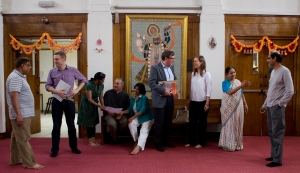This Sunday’s Gospel reading is Mark 6.30-34 (or 30-34 and 53-56)
Because so many people were coming and going that the disciples did not even have a chance to eat, Jesus said to them, “Come with me by yourselves to a quiet place and get some rest.” So they went away by themselves in a boat to a solitary place. But many who saw them leaving recognized them and ran on foot from all the towns and got there ahead of them. When Jesus landed and saw a large crowd, he had compassion on them, because they were like sheep without a shepherd. So he began teaching them many things.
This passage shows the two sides of Jesus ministry to people – the feeding the crowds, and the disciples, require is spiritual (rest, quiet, teaching) as well as physical.
That’s the way God has made us – flesh and spirit. Jesus’ teaching and his actions show the importance of both. He has no time for religious leaders who use ‘spiritual’ language to justify material inequity. But he warns us that material food alone isn’t enough. This is a balance we need in our own lives – and in the kind of world for which we are striving to build for others.
Christian teaching on the ‘Sabbath’ is a case in point. Jesus’ example makes clear that we are not to make an idol of particular regulations – The Sabbath is made for human beings, not humans for the sabbath – but having times of ‘Sabbath’ is essential in the Christian life. Without such times, we lose perspective, and more and more rely on our own resources rather than God’s grace. As Pope John Paul II reminded his clergy, without a time of Sabbath, we become ensnared in the ‘idolatry of work’, forgetting that it takes its places in a wider life of wonder, love and praise.
Prayer Intentions
Pray for all involved in Christian ministry in demanding contexts, such as Britain’s inner-cities – among them the staff of the Church Urban Fund and the Contextual Theology Centre (CTC) – that they may balance their work with times of rest and refreshment. Pray for Sr Josephine Canny, Chaplain to CTC’s Jellicoe Community as she helps the Centre’s interns find this balance in a context that is new to many of them.



